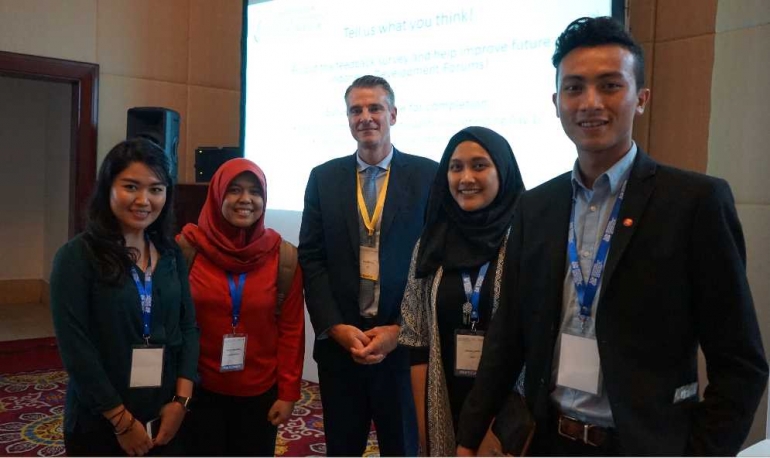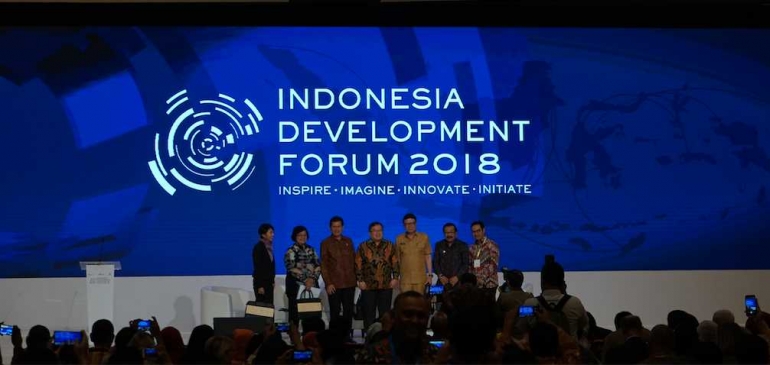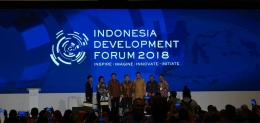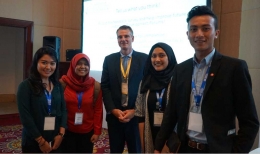Jakarta, 10-11 July 2018 -- Hosted by the Ministry of National Development Planning and supported by the Australian government through the Knowledge Sector Initiative (KSI), Indonesia Development Forum (IDF) was conducted in Jakarta on 10-11 July 2018 with theme 'Pathways to Tackle Regional Disparities Across the Archipelago'. This forum brought people from different sectors to discuss about narrowing disparities in Indonesia.
In the plenary session, the Minister of National Development Planning and the Head of the National Development Planning Agency (Bappenas), Prof. Bambang P.S. Brodjonegoro, provided how the disparity in Indonesia is shown through Human Development Index (HDI).
According to the HDI, DKI Jakarta province has a very high HDI (80), meanwhile Papua province has a low HDI (<60). For the equality in development in Indonesia, it is important to boost the development growth in the eastern part of Indonesia and maintain to the development growth in Java region.
One of the solutions in narrowing the disparity in Indonesia is by promoting local products. A case in Sulawesi shows how the local community manufacture their natural resources. This practice has led to a high economic growth in Sulawesi. Another case is in Kulon Progo.
The Regent of Kulon Progo, Hasto Wardoyo, elaborated how local products are used for economic improvement in Kulon Progo. The community in Kulon Progo produces their own mineral water and make their own tea and coffee brand. They also establish Tomira (Toko Milik Rakyat), which is a local supermarket where the local people can sell their products in it.
A professor from the University of Illinois, Prof. Geoffrey J.D. Hewings, explained how policy-making should be done to narrow the disparities in Indonesia. It is essential to evaluate the impact of a policy and not rush into policy.
One policy could have heterogeneous impact. There is a term named specially blind policy, in which a policy that is implemented in one region could give impacts to the other region where the policy is not even implemented there. He emphasised that attention to the regional problem should be the first priority.
Arifi Rudiyanto, the Deputy Minister for Maritime and Natural Resources in Bappenas, explained that Indonesia's vision in narrowing disparities is in line with Sustainable Development Goals (SDGs) number 10, reduced inequalities. "No one left behind is the imperative core principle of SDGs", he said. Inequality could happen in economic sector, education, health, gender issues, region, and so on.

The importance of agricultural development was mentioned by Samsul Widodo (the Director General for Underdeveloped Regions, Ministry of Villages, Development of Disadvantaged Regions and Transmigration). The policy in Indonesia still focuses on the production, where it is supposed to focus on post-harvesting and marketing also. He also mentioned the potential of connecting agriculture with economy digital, like what have been done by efishery, pasarlaut, limakilo etc. His ministry cooperates with start-ups to bring local products from disadvantaged regions to the urban area.
The second day was opened by a topic about reducing disparity through optimisation of culture in eastern Indonesia. One of the examples is the effect of a movie titled 'Laskar Pelangi'.
Since the movie came out in 2008, Belitung has become a tourist destination and the income of Belitung has been quadrupled. This case shows how culture, in this case is art, could affect the planning and development of a region. Hilmar Farid, the Director General of Culture in the Ministry of Education and Culture, mentioned that culture needs to be seen as a potential source of income, instead of a cost center. Another example is Heka Leka, an organisation in Maluku that focus on improvement in education.
Siwalima(Kebersamaan/Togetherness) is a core value of this organisation, which means accepting the differences as a strength of unity, togetherness, and kinship in life. The optimism of the potential of eastern Indonesia was showed by the Founder and Director of Heka Leka, Stanley Ferdinandus, who mentioned, "Matahari terbit dari timur, dan dari situlah Indonesia akan dibangun" (the sun rises from the east, and from there too Indonesia will be developed).
In narrowing the disparities, the innovations in local governance and development is also a key. According to Prof. Wihana Kirana Jaya, there are two bottlenecks in local governance, which are the mindset and overlapping regulation.
He also mentioned the needs of incentive in changing the behaviour of people. The needs of a new incentive mechanism was also mentioned by Ward Berenschot from KITLV. He did a research about clientelism (transactional politic) and recommended the electoral reform and incentive re-structure to alleviate transactional politic. A success story in local governance was presented by the representative of State Secretariat of Indonesia, Adyawarman. He explained the case study in Batang about innovation in local governance. The graph above shows the process of how the innovation in local governance can be institutionalised.
IDF 2018 was closed by Ministers Dialogue. Prof. Bambang P.S. Brodjonegoro explained how the local wisdom can be utilised and capitalised for the development of local governance. He also emphasised the importance of improving the quality of budget in Indonesia through the improvement in planning. In addition, local government needs to be careful in deciding the priority of a region.
Writer: Annisa M. (AFOSP Intern 2018 )
Baca konten-konten menarik Kompasiana langsung dari smartphone kamu. Follow channel WhatsApp Kompasiana sekarang di sini: https://whatsapp.com/channel/0029VaYjYaL4Spk7WflFYJ2H








